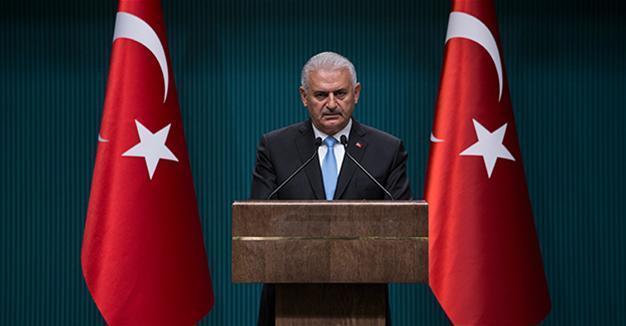Turkey reshuffles gov’t, keeps foreign team, changes PM’s aides
ANKARA

Turkey’s Prime Minister Binali Yıldırım announced the much-anticipated cabinet reshuffle on July 19, changing four of his five deputy premiers while keeping the foreign team in place and introducing six new names.
The new cabinet was announced by Yıldırım after his unannounced meeting with President Recep Tayyip Erdoğan whose influence on governmental actions have been much more obvious after he was elected head of the ruling Justice and Development Party (AKP) in late May.
“All our friends who have been appointed to the cabinet and those who are leaving have outstanding qualifications. This is a flag race, a regeneration [of the government],” Yıldırım told reporters after he announced the new cabinet.
One of the most important aspects of the change is the fact that Prime Minister Yıldırım renewed four of his five deputy prime ministers, including the government spokesman. Deputy Prime Minister Tuğrul Türkeş, who joined the AKP after his resignation from the Nationalist Movement Party (MHP) and Deputy Prime Minister Veysi Kaynak, who was responsible for Syria related issues as well as refugees, have been left out of the government.
Two other Deputy Prime Ministers Nurettin Canikli and Numan Kurtulmuş, who is also the government spokesman, have been appointed as defense and culture-tourism ministers respectively while the latter will have to abandon his role as spokesperson.
Only Deputy Prime Minister Mehmet Şimşek who is responsible for coordinating the economy could secure his position as the deputy premier in the new cabinet.
Yıldırım appoints four new aidesAs a result of these changes, Yıldırım promoted Justice Minister Bekir Bozdağ and Health Minister Recep Akdağ as new deputy prime ministers while appointing Bursa Deputy Hakan Çavuşoğlu as one of the deputy premiers. Çavuşoğlu is among six new names in the cabinet.
These changes indicate that Yıldırım wanted to work with figures he can better cooperate in the new process.
Foreign, energy teams in placeDespite expectations, no major changes have taken place in the foreign team. EU Minister Ömer Çelik and Foreign Minister Mevlüt Çavuşoğlu preserved their places although speculations were high that President Erdoğan’s chief foreign policy advisor İbrahim Kalın could resume a role in a foreign-policy related position at the cabinet.
On economy, Mehmet Şimşek and Economy Minister Nihat Zeybekçi have remained in their roles in coordinating economy. Canikli’s role in coordinating investments and banking will be transferred to one of the new deputy prime ministers.
Energy Minister Berat Albayrak, son-in-law of President Erdoğan, will continue his service to the government as the energy minister.
Development Minister Lütfi Elvan and Finance Minister Naci Ağbal also secured their positions.
Six new namesAlong with Deputy Prime Minister Hakan Çavuşoğlu, Justice Minister Abdülhamit Gül, Labor Minister Jülide Sarıeroğlu, Youth and Sports Minister Osman Aşkın Bak, Food and Agriculture Minister Eşref Fakıbaba and Health Minister Ahmet Demircan are new names in the government.
Former Labor Minister Mehmet Müezzinoğlu, Youth and Sports Minister Akif Çağatay Kılıç, Food and Agriculture Minister Faruk Çelik, Culture and Tourism Minister Nabi Avcı have left their positions to their successors through the reshuffle.
Two female ministersWith the appointment of Jülide Sarıoğlu, a lawmaker from Adana, as the labor minister, the number of female ministers in the Turkish cabinet increased to two. Family Minister Fatma Betül Sayan Kaya, who was deported by the Dutch government from the Netherlands in a bid to avoid her meeting with the Turkish community in Rotterdam ahead of the April 16 referendum, could keep her position in the government. Sarıeroğlu is an expert on trade unions and had served at the Confederation of Righteous Trade Unions (HAK-İŞ).
Key minister in placeInterior Minister Süleyman Soylu has become one of the figures who could protect his position in the government due to his relentless struggle against the Fethullahist Terror Organization (FETÖ) and the outlawed Kurdistan Workers’ Party (PKK).
 Turkey’s Prime Minister Binali Yıldırım announced the much-anticipated cabinet reshuffle on July 19, changing four of his five deputy premiers while keeping the foreign team in place and introducing six new names.
Turkey’s Prime Minister Binali Yıldırım announced the much-anticipated cabinet reshuffle on July 19, changing four of his five deputy premiers while keeping the foreign team in place and introducing six new names.